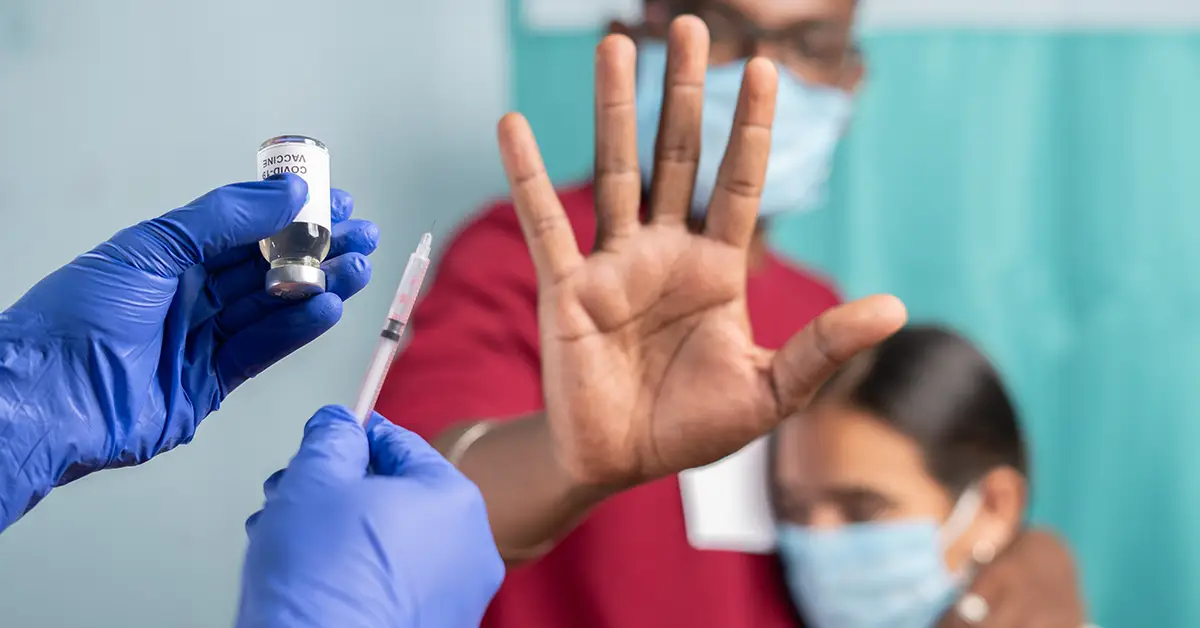Vaccines have become so prevalent in our society lately, and there are mandates everywhere — schools, workplaces, for travel, and for immigrants. Luckily, for immigrants seeking lawful permanent residency in the United States either through USCIS or Consular Processing, there are options to avoid the vaccination requirement by obtaining a vaccine waiver.
Every applicant for lawful permanent residency must submit to the immigration medical exam to ensure that
- They are not carrying any communicable diseases that could affect the public’s health,
- They do not have any dangerous physical or mental disorders associated with harmful behavior including drug abuse/addiction, and
- That they are up to date on all medically appropriate vaccines.
If the applicant does not have all the vaccines for permanent residency and does not file a vaccine waiver or have a medical exemption, they will be inadmissible. In this case, they will not receive their green card or be allowed to immigrate to the United States.
Required Vaccines for Immigration
USCIS follows the CDC and ACIP’s guidelines on which vaccines are “medically appropriate.” As of now, the following vaccines are required for admission into the U.S.:
- Tetanus and diphtheria
- Mumps, measles, rubella
- Polio
- Pertussis
- Hib
- Hepatitis A
- Hepatitis B
- Rotavirus
- Meningococcal
- Varicella
- Pneumococcal
- COVID-19
- Seasonal influenza
At the medical examination, the applicant will meet with a civil surgeon (if within the U.S.) or a designated panel physician (if outside of the U.S.). The applicant will need to submit to all vaccines that are age appropriate and medically appropriate at that time. Applicants should note that COVID-19 is age appropriate for everyone over 6 months old.
However, many people are opposed to vaccines for lots of different reasons. Whether your opposition is based on medical reasons or religious reasons, this post will explain how you can get around vaccines for immigration purposes.
Medical Exemption vs. Religious Exemption
Immigration offers both medical exemptions and religious exemptions to vaccines. However, medical exemptions can be much harder to get.
Medical Exemption for Immigration
To get a medical exemption, the applicant must show that they have a contraindication to the vaccine they are seeking to be exempt from. Medical exemptions don’t apply to all vaccines in any form — they only apply to one vaccine at a time.
As an example, if the applicant sought a medical exemption from the COVID-19 vaccine, they would need to show that they had a documented allergy to an ingredient present in all available COVID-19 vaccines, or that they had a severe allergic reaction (think anaphylactic shock) to a prior dose of a COVID-19 vaccine. In the case where they had a severe allergic reaction to a prior dose, the Civil Surgeon may determine they are still able to get a different kind of available COVID-19 vaccine with different ingredients — but this will be determined on a case-by-case basis.
These are the only two ways a person can get a medical exemption for the COVID-19 vaccine, because that is the definition of contraindication per the CDC for that specific vaccine.
There are a lot of common misconceptions we encounter. For example, some people will assume that for children, USCIS will be more lenient. Others assume if they have a documented heart condition, they will meet the criteria for the COVID-19 vaccine medical exemption, and others believe that if they are pregnant they will also be granted an exemption. This is not the case. All people 6 months or older must receive the COVID-19 vaccine to gain lawful permanent residency unless they meet one of the two criteria outlined above.
Even if the applicant goes to their regular doctor and gets documentation of their medical condition along with a recommendation from their doctor that they not receive the vaccine, the applicant would still have to present that evidence to the Civil Surgeon, who would likely reject it for not meeting the narrow criteria outlined by the CDC. Even if the Civil Surgeon does accept it, USCIS or the consulate could still reject the exemption for not meeting the criteria for a medical exemption from vaccination for immigration. If a person does not fit into the narrowly defined constructs of what a “contraindication” is, a medical exemption is not a good option.
Religious or Moral Exemption
Instead, applicants might consider a religious or moral vaccine waiver from the vaccination requirement. The First Amendment protects our rights to free speech and religion. Luckily, this protection extends to applicants applying for a Green Card who do not want to take vaccines. Filing a vaccine waiver from the vaccination requirement based on religious or moral beliefs involves filing Form I-601, Waiver of Inadmissibility, and the applicable filing fee of $1,050 that accompanies the form. The applicant should also attach a separate sworn statement detailing how they meet the requirements for a vaccine waiver.
But there’s a lot more that goes into it.
What Does “Religious or Moral” Mean?
The applicant needs to show that they have a comprehensive belief system, one that is religious/spiritual or moral to get a vaccine waiver for immigration. A religion of one is totally fine — the applicant does not need to belong to a church or organized religion to be granted an exemption under the First Amendment. However, to get a vaccine exemption for immigration, the applicant would have to show that they have a comprehensive belief system extending far beyond the vaccination issue that prompts them to seek a religious exemption.
In practice, this means articulating what they believe beyond vaccines, and then tying those beliefs directly to their objections to vaccination. There’s not a huge difference between “religious” and “moral” for the purposes of a vaccine waiver for immigration; the “moral” element just covers all beliefs that are not traditionally associated with a structured or organized religion.
Meeting the Requirements for a Vaccine Waiver for Immigration
US Citizen and Immigration Services has developed three requirements to help ascertain whether or not an applicant falls under the protection of the First Amendment.
- The applicant must be opposed to all vaccinations in any form;
- The applicant’s objections must be based on religious beliefs or moral convictions; and
- The applicant’s beliefs must be sincere.
Reading those requirements, you’re probably thinking “I can totally do that!” However, in practice, it’s a little trickier than it appears.
The Applicant Must be Opposed to All Vaccines in Any Form
To show that an applicant is opposed to “all vaccinations in any form,” the applicant has to be just that . This means that the applicant should not be getting some vaccines at their immigration medical examination and rejecting others.
Another good rule of thumb is not to be too specific when discussing vaccines, such as objecting to certain types of vaccines or very specific ingredients that are only in some vaccines. The applicant should make sure their objections apply to all vaccines in any form rather than pointing out specific vaccines and discussing potential religious or moral issues with those. While one can be opposed based on very specific reasons that may only apply to some vaccines, it is important that the applicant provide enough other objections to vaccines that apply to all vaccines more generally.
What if I Had Vaccines Before?
If the applicant has a recent vaccination history, they need to explain that history. They need to explain what the circumstances surrounding their last vaccine were, how their beliefs have changed since then, or how they violated their beliefs at the time.
“Recent history” means anything the applicant did in their adult life. If a family is applying together and USCIS will also have the medical records of the applicant’s children, the applicant needs to be able to explain why the children received certain vaccines and not others, or why the applicant vaccinated their children but doesn’t want to get vaccines themselves. If the child is also applying for a vaccine waiver, the applicant will need to fully explain the child’s vaccination history along with their own in their sworn statement.
This can be a daunting task, and it may be good to seek out professional help for meeting this criterion. However, it’s important to remember that having a vaccination history does not make your vaccine waiver automatically denied. U.S. immigration reviews these religious or moral vaccine waivers on a case-by-case basis, so if you are able to explain your vaccination history well and explain what has changed or the circumstances surrounding your prior vaccines, they will consider all that information when deciding whether or not you meet the criteria for a vaccine waiver.
While having a recent vaccination history is not a complete deal-breaker for getting a vaccine waiver for immigration, it’s definitely a hurdle, and if this is your situation, you may want to consider consulting an immigration attorney to help you sort through the process.
The Applicant’s Objections must be based on a Religious or Moral Belief
The best way to explain how to meet this criterion for a vaccine waiver for immigration is by explaining what not to do.
- Don’t make political objections. The applicant should not talk about having “free will” or the “right to make decisions” over their own body. Both of these objections are political and personal in nature and may lead to a denial when immigration realizes they are not religious objections to vaccination.
- Don’t object to the mandate. A huge mistake we see a lot is applicants who are objecting to the mandates, not to the vaccines themselves. Arguments like “the government can’t tell me what to do with my body” essentially mean that if a vaccine wasn’t mandatory, the applicant would have no problem getting it. Remember, as an applicant, you are not trying to convince USCIS that the vaccine mandates are unconstitutional, you are trying to convince them that you are an exception to the rule. There’s a huge difference.
- Don’t make safety objections. The applicant should not include any objections about how vaccines could “harm” them or how they aren’t “safe”. They shouldn’t include any information about potential vaccine injuries or having witnessed injuries from friends or family members. These objections are not religious and the vaccine waiver application from the vaccination requirement may be denied.
- Don’t make efficacy objections. The applicant should not include any objections about how vaccines are not effective. This is not a religious objection and may result in a denial.
- Do explain your fundamental beliefs in detail and how you came to your faith without referencing vaccines.
- Do object to the concept of vaccination and the components in vaccines.
- Do quote religious scriptures whenever possible and make sure you explain exactly how vaccines violate your beliefs and what the consequences of the violation would be.
The Applicant’s Beliefs must be Sincere
To meet this requirement, the applicant must show that they live by their beliefs on a daily basis. The applicant should discuss how they treat their bodies in other areas of life, their relationship to their faith and daily practices, and any inspirational experiences that inspired them throughout their lifetime.
The Process for a Vaccine Waiver for Immigration
The I-601 vaccine waiver from the vaccination requirement can be filed with the initial I-485 Green Card Application and I-693, Report of Medical Examination and Vaccination Record, in the very beginning, or it can be filed later.
Filing it later means that the applicant files the I-485 first, goes for their medical exam later, and waits until after the medical exam has been completed and returned to immigration to file the vaccine waiver.
A common misconception we see a lot is an applicant believing that a request for the medical exam is a request for the vaccine waiver. Just because USCIS issues a request for the applicant’s medical exam doesn’t mean their waiver is due yet.
The applicant can go to their medical exam, inform the Civil Surgeon that they are planning to file a vaccine waiver, and decline all vaccines. Remember, the applicant should not get some vaccines and decline others at their medical exam — they need to show they are “opposed to all vaccines in any form.”
Once an applicant has turned in their medical exam with their incomplete vaccination record, USCIS will sometimes issue another Request for Evidence or a Notice of Intent to Deny based on an incomplete vaccination, but they will not outright deny a case without first providing the opportunity to file the vaccine waiver.
Once an applicant submits their I-693 Medical Exam form, they can get to work on their form I-601 and sworn statement.
Applying for a Vaccine Waiver through Consular Processing
If the applicant is applying via Consular Processing, the applicant will get a notice to attend their medical exam a few weeks before the interview date. They should attend their medical exam, decline all vaccines, and go to their interview. At their interview, they will be found inadmissible for their vaccination record. At that point, the applicant has one year to file form I-601, Application for Waiver of Grounds of Inadmissibility.
Don’t Just Take the Vaccines!
Immigration processes can be overwhelming. From start to finish, the whole process is long and expensive. USCIS is counting on applicants to take the easiest way out and just “take the vaccines” instead of asserting their First Amendment rights.
Siri & Glimstad attorneys understand that this process is daunting, but we are here to help. We can assist you in putting together an I-601 waiver and help ensure you meet the requirements. We can help with answering all your questions and guiding you through the process. Our attorneys have experience and expertise in all aspects of immigration, but we are especially equipped to help you handle the vaccine waiver. We have helped hundreds of people obtain a waiver from the vaccination from immigration, and thousands obtain an exemption from school or work. We currently maintain a 100% success rate for vaccine waivers for immigration.
We will work with you to prepare the I-601 forms, to help draft the sworn statements, and to prepare you for your interview. Inquire regarding our services here.





